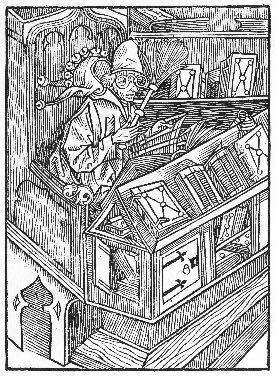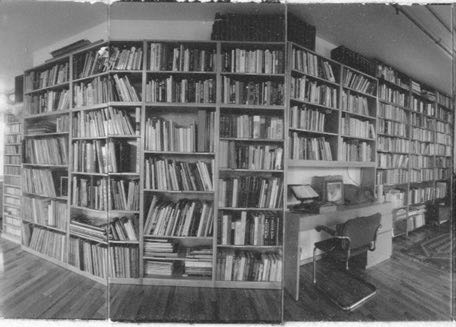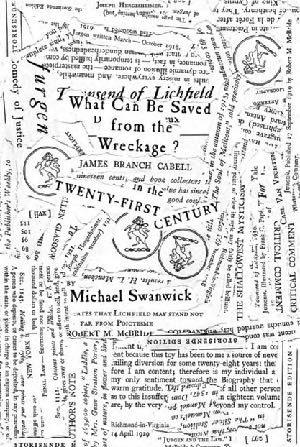
August 2007

22 August 07
Composite
view of the bookshelves in Allen Ginsberg’s loft, ca. 1997.
Courtesy of Bob Rosenthal and the Allen Ginsberg Trust.
Click here for
link to large composite view of the loft.
19 August 07
Durchgelesen ; or, Just Looking
— [Mary
Shelley] Frankenstein ; or, The Modern Prometheus (3
vols., 1818). I was in the Department
of Rare Books and Special Collections at Firestone Library, Princeton
University, last week, and had the opportunity to look into the first
edition, in three small volumes. The portrait of Victor Frankenstein
discarding the outdated knowledge of the past and remaking himself
as a bold scientist becomes only more interesting when one thinks
of him as a mirror of Percy Shelley ; that Victor’s revulsion
for his creation induces such utter passivity (and brain-fever) is
essential to the novel, for it gives the monster time to educate
himself — even as this element of the Gothic mode
defies modern-day expectations of plot and activity ; also delightful
is the complexity of the narrative and the layering of “ apparent
estrangement devices ” (to use Clute’s phrase).
— Samuel Beckett. The Grove Centenary Edition . Paul
Auster, Series Editor (4 vols., 2006)
I tried working my way through Beckett this summer, and found a few briefly
rewarding sentences and some bleak, black humor, but the grinding ferocity
proved too much. I am sure I will try again from time to time ; for
I remember passages in Watt (in the French original) that
were simply a hoot. The fault lies with this reader ; and I am not unaware
of it.
There is an excellent sentence in Salman Rushdie’s introduction to the second
volume of the Novels that must stand as the ultimate directive to a reader :
“ Stop
asking for what is not there and you start to see what is. ”
13 August 07
Childhood Toys : A Building Block
Found
on a shelf yesterday my old copy of the Modern Library anthology
of Great Tales of Terror and the Supernatural , edited
by Herbert A. Wise and Phyllis Wagner. The introduction can be dated
to late 1943, the copyright date is 1944, but this big paving stone
of a book is clearly a shoddy reprint from the 1970s (with the last
pages of introduction reproduced from bad camera work). The stories
transcend the scruffy pseudo-denim textured boards and browned paper
(the toning of the paper differs from that seen in wartime books).
The anthology remains a good, even canonical sample of the genre
up to H. P. Lovecraft. The introduction and several of the stories
give clear indication that the editors were familiar with Supernatural
Horror in Literature , evidently from the Arkham House
edition of The Outsider , since the Abramson reprint
did not appear until 1945. It is also, clearly, one of the most influential
and long-lived disease vectors for the Derleth fabrication of the
Cthulhu mythos : the anthology is still in print and I suspect
the biographical note to “ The Rats in the Walls ” (with
the infamous Farnese/Derleth canard “ All my stories . . . ”)
remains unaltered.
There were several stories I remembered distinctly from this volume
(even if I might first have encountered “ Leningen versus
the Ants ” as a eleven-year-old listener in Middle End
South at Camp Choconut).
I will explore further as
a number of the stories do not leap out from memory.
5 & 7 August 07
Re-Reading Little, Big (with a post script)
I have been re-reading Little, Big by John Crowley and in addition to the pleasures of the text, there have been other rewarding intervals. This is the best of three pictures of a resident red admiral butterfly reading page 422, about 18:30 on 5 August 2007 :

The picture of its mate at page 427, the section title for The Fairies’ Parliament, is too dim to reproduce.
The written portion of this entry, on re-reading Little, Big , will follow.
Re-reading Little, Big :
I had two specific purposes in mind when I began to re-read Little, Big this month, looking at whether certain passages were as rich and delightful as I remembered ; they are. I took a few notes on literary echoes in the course of this re-reading of Little, Big — The Wind in the Willows and H. G. Wells and Teddy Roosevelt and Henry Miller are ripples I had not noted in previous readings — the novel contains so many intertwined stories, however, that to discuss single threads of the fabric risks devolving into trivialities. Page by page, the pleasures only grow with re-reading.
At an interesting panel discussion on Little, Big at Readercon earlier this summer, I found that the discussion circled endlessly about connections between the novel and the “ European ” fantasy tradition (meaning British and European). What has always struck me about the book is how utterly American — and Old American at that — are its preoccupations. The Anglophile cultural baggage of the first generation of “ the children of the children of Time ” seems just that : clothes and attitudes some of the characters wear, not their fundamental natures. The novel is simultaneously a reflection on the quasi-utopian American impulse to return to the countryside and a passionate love story about New York City in its darkest hour (think Thomas Wolfe and Bright Lights, Big City before the fact). Both narrative strains are fueled by the experiences of America during the post-Nixon years of energy crisis and perceived decline.
One
of my aims was to make systematic notes on the Least Trumps, reminded
by correspondence I had with the late Reno Odlin, who once proposed
to illustrate them.
The Least Trumps are identified as persons, places, things, notions, and
are clearly distinct from the customary cards of the tarot. I found fifteen
named Least Trumps, and suggest six others (in italics).
Persons :
the Traveller, the Host, the Sportsman (Piscator), the Cousin, and
the Stranger.
Places : the Vista, the Banquet, the Wild Wood ,
the Park , and the Door .
Things : the Bundle, the Secret, the Seed, the Gift, and
the Knot.
Notions : Convenience, Multiplicity, the Journey, Possibility , Generation ,
and Somehow .
I considered but rejected the following : Change, Memory, Time, the City, and the Bird (or the Stork). I still think that something interesting would come of a project to illustrate these Least Trumps, for on page 354 is a wonderful sentence which demonstrates the validity of the critical fiction : “ Out of the proper arrangement of what you do know, what you don’t know may arise spontaneously. ”
None of the foregoing seems to say quite as much as the red admiral repeatedly landing on Little, Big today when I was reading pages 412-3 and after.
7
August 07
Post Script to Re-Reading Little, Big
Received the handsome multipurpose poster (type specimen and Peter Milton
illustration sampler and announcement and proof print) of the Incunabula 25th
anniversary edition of Little, Big in today’s mail ;
it presents the passage Suppose One Were a Fish. I will make one brief gloss
on this passage, also relevant to Russell Eigenblick’s career :
“ Dagon ” by
Avram Davidson (most readily available in The Avram Davidson Treasury ).
What
Can Be Saved from the Wreckage ?
James Branch Cabell in the Twenty-first Century
by
MICHAEL SWANWICK
Forthcoming 1 November
2007 from Temporary Culture, Michael Swanwick’s monograph on the
celebrated Virginia fantasist James Branch Cabell (author of Jurgen ),
with a preface, "Jurgen Down Under", by Barry Humphries.
What Can Be Saved from the Wreckage ? will be published
in an edition of 17 hand bound copies, signed by the authors and with
a leaf signed by James Branch Cabell inserted in each copy. Price to
subscribers upon request from wessells [at] aol [dot] com .
A trade issue of 200 copies in paper
covers will be available at World Fantasy Convention ; advance orders
accepted. Details here.
This creaking and constantly evolving blog of the endless bookshelf : I expect that some entries will be brief, others will take the form of more elaborate essays, and eventually I will become adept at incorporating photos or comments and interactivity. Right now you’ll have to send links to me, dear readers. [HW]
electronym : wessells
at aol dot com
Copyright © 2007 Henry
Wessells and individual contributors.
Produced by Temporary
Culture, P.O.B. 43072, Upper Montclair, NJ 07043 USA.

